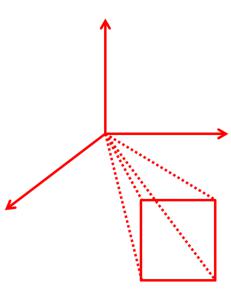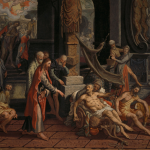Sermon preached at Burke UMC LifeSign service 1/28/2012
Text: Exodus 16
I’ve got a daily bread problem. 35 pounds of it to be precise. So I’m not sure I have any business asking God for more daily bread. When I was in college and had much higher metabolism, I used to go picnicking in the Virginia mountains with a loaf of round sourdough bread, a block of cheese, and a block of salami. That was daily bread. But now that I’m trying to reduce, I feel like I should be asking God for my daily Healthy Choice 200 calorie microwavable entrée instead.
The world has a daily bread problem too. According to the United Nations’ Food and Agricultural Organization, 925 million people were severely malnourished in 2010. I’m not throwing out this number to make you feel guilty. It just seems like an appropriate topic to wrestle with if we’re asking God to give us our daily bread. World hunger is one of those problems that every beauty pageant contestant gives a two-minute speech about, but it’s more complicated to resolve than you might think.
There have been a variety of attempts to resolve the problem of hunger over the past hundred years. In Russia in the 1930’s, the people in the cities weren’t getting enough food, so their dictator Joseph Stalin decided to collectivize all the farmland as state property to make things more efficient. The Russian farmers pitched a fit and tried to sabotage Stalin’s efforts. So Stalin sent in soldiers to seize all their grain and caused a famine that killed millions of people.
In the West, the solution to world hunger has been a set of technological advances in agriculture called the Green Revolution. Through improvements in fertilizer, pesticide, and genetic engineering, it’s become easier to grow a lot more food quickly. But this hasn’t made hunger go away. Instead it’s wiped out millions of third world farmers who can’t compete with American agro-giant firms that use the technology. The collapse of Mexico’s agricultural society is one of the main reasons that migration to the US increased dramatically over the past two decades.
Since I’m a preacher, I guess it shouldn’t surprise you that I find the answer to world hunger in the Bible, specifically our passage from this evening about how God fed the Israelites manna in the desert. Now let me guess what you’re thinking. How in the world can you call it a solution to the problem of world hunger for God to rain bread out of the sky? Like that’s going to happen! The irritating things about trying to apply Old Testament stories to our lives today is that in the Old Testament God performs all these crazy miracles that just don’t happen anymore.
So who makes the food that we eat today? Where does it come from? Do the grocery stores make it? Do the farmers make it? Who provides the sunlight and the rain and the soil that allow plants to grow and give animals something to eat? Who keeps the earth rotating the same way every year around the sun so that there can be seasons that are predictable and we can plant a seed in April that will grow into something we can harvest and eat in September? Who designed the chemical process of photosynthesis by which light and water and carbon dioxide make our crops not only grow but also produce the air that we breathe? Sending manna down from the sky is actually a much simpler miracle for God to pull off than the beautiful miraculous process by which He creates every piece of food that we have ever eaten.
All of our daily bread comes from God. And the solution to world hunger is for humanity to recognize this miracle and live according to the same boundaries that God set out for Israel in the desert. The Israelites didn’t have a choice. Obeying God’s command was a matter of life and death. Because they only gathered as much manna as each family needed, all of the Israelites survived. And if they tried to horde their manna, it got worms and turned foul. The same thing happens to us today. When we take more daily bread than we need, it causes our lives to rot and fill with worms. The second boundary God set for the Israelites is He forced them to rest every seven days. Again, they didn’t really have a choice; there was no manna on the ground for them to gather. We can always gather more manna by disregarding the Sabbath, but at what point does it stop nourishing us? How many people in this community work so hard to get more manna that they don’t have any time or energy to enjoy the manna that they end up receiving?
The difference between us and the ancient Israelites is that we can choose to pretend that God is not our provider. We can pretend that we need more daily bread than other people. We can pretend that we deserve it more because of all the degrees that we got in school, all the 80 hour weeks that we put in, not recognizing that whatever knowledge we use to earn our daily bread is itself a gift from God.
The ancient Israelites had to obey God; it was a matter of survival. When people are in extreme conditions like a desert, it’s easier to mold them into a cohesive community. But in our world, necessity is not a motivating factor. We can choose to live completely self-reliant, selfish lives if we want to. And living this way may keep us physically comfortable most of our lives, but it won’t provide the spiritual bread that we need to nourish our souls. When Jesus was preaching to a crowd in John 6, He told them, “Do not work for food that spoils, but for food that endures to eternal life, which the Son of Man will give you.” The people in the crowd asked Him to elaborate and so He said:
I am the bread of life. Your ancestors ate the manna in the wilderness, yet they died. But here is the bread that comes down from heaven, which anyone may eat and not die. I am the living bread that came down from heaven. Whoever eats this bread will live forever.
If you think it sounds weird for Jesus to talk like that, a lot of the people listening to Him felt the same way. The Bible tells us that Jesus lost a lot of followers who thought he was telling them to be cannibals. They didn’t understand that He was referring to the way that He was about to sacrifice His body for our sins in order to make a new body made up of many people who accept Him as their Lord and savior. This body that Jesus created by allowing His body to be crucified is the bread of life, because it provides the perfect foundation for nourishing the human race both physically and spiritually.
The problem with the church today is we think Jesus is just our buddy or maybe our life-coach. But Jesus tells us that He is our food; He is our daily bread. I realize that this is a bizarre concept. I’m going to offer you my own imperfect interpretation. We are eternally nourished every day to the degree that we are fully integrated into the life of the body of Christ. Our daily bread is the meaning each day of our life receives when we participate in the work of God’s kingdom. If every Christian in the world really sought the daily eternal bread that we feast upon every time we follow Jesus’ call to share His love, then we would find a way to provide for the 925 million people in our world who do not get their daily bread and there would be no world hunger today.
The body of Christ exists to satisfy the hunger of humanity. If God only wanted to fill our bellies, He would rain down manna from heaven every morning. But He knows that we have a deeper hunger to be a part of the harvest. That’s why He doesn’t do all the work Himself. He gives us the means not only to be physically fed but spiritually fed while we share the fruits of our labor freely with each other. Jesus tells His disciples, “My food is to do the will of Him who sent me and to finish His work” (John 4:34). We will never have to go hungry because Jesus has invited us to share every day in His Father’s work which is our daily bread. Let us accept His invitation to what is truly a heavenly feast.














